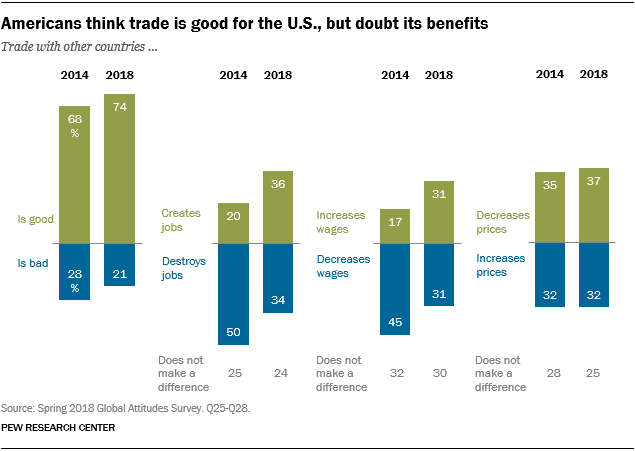The US economy, because of its enormous internal domestic market, is actually much less exposed to the effects of international trade than smaller economies around the world. For the world economy as a whole, the ratio of imports/GDP is about 28%, using World Bank data. For the US economy, the ratio of imports/GDP is 15%, about the same as Japan. For China, the import/GDP ratio is 18%; for Korea, it’s 38%; for Germany, with all of its within-the-European-Union trade, the import/GDP ratio is 40%.
For the other North American countries, the import/GDP ratio is 33% for Canada and 40% for Mexico. The only fairly large economy I know with a lower import/GDP ratio than the US is Brazil, where the import/GDP ratio is 12%.
But although imports (and exports, too) are considerably smaller share of the US economy than the vast majority of other countries, the US tends to be more concerned about potential injury from international trade. Bruce Stokes reports the results of a survey done across 27 countries, which account for about two-thirds of the world’s GDP, in a Pew Foundation Report, “Americans, Like Manyin Other Advanced Economies, NotConvinced of Trade’sBenefits: Emerging market publics more likely to link trade to more jobs,better wages”(September 26, 2018).
For example, Americans are less likely to feel that “trade is good,” and more likely to be concerned about adverse effects on jobs and wages. However, Americans are more likely to believe that trade helps to keep prices low.

However, one of the intriguing results from this survey is that Americans area apparently have much more positive attitudes about how trade affects jobs and wages than they did in 2014. For example, The Pew results suggest that the two countries where attitudes about trade, jobs, and wages have shifted most positively since 2014 are the US and Poland.


Here are the overall shifts in US attitudes toward trade from 2014 to 2018.












Leave A Comment